I'd never heard of Healwell before and took a look over their offerings. Has anyone used the products? Beyond the…
Monday Morning Update 3/14/11
From Tobias: “Re: privacy and security. Local and state legislatures are afraid of HIEs and other electronic data because they perceive that because data is electronic, it will be easier to hack. I’m curious if you have any data or can use your network to find any that speaks to this.” I’m interested in anyone’s contribution. The question made me ponder – why do consumers fear healthcare data breaches, which have no financial ramification, and even though despite splashy headlines, haven’t resulted in much of anything other than some tabloid articles and lots of free credit checks? My conclusions: (a) people trust banks a lot more than healthcare providers when it comes to privacy, probably rightly so because banks have a much more straightforward mission that is aligned well with security investments; (b) they still incorrectly believe that the greatest threat to electronic data is mysterious foreign Internet hackers instead of inquisitive provider employees; and (c) a financial breach affects thousands of people scattered everywhere, but friends and neighbors wouldn’t know you were affected, while medical disclosures have far less dramatic outcomes (instead of draining your bank account, someone finds out you’ve had a yeast infection) but involve the people you see every day. I don’t trust hospitals either, but not because of their electronic systems – any organization that believes that a shower curtain drawn between the gurneys of ED patients provides adequate privacy has already given up the charade. Not to mention that people fear being denied insurance coverage or being fired because our hodgepodge medical system encourages dumping the expense of their care on someone else. Electronic data hacking is the least of healthcare’s privacy and security worries.
From Bobby Orr: “Re: Francisco Partners. Running away from HIT? That’s API, AdvancedMD, and Healthland all in about 3-4 weeks.” I ran Healthland as an unverified rumor, but I wouldn’t be surprised. What better time to cash out an HIT company than right now? It’s like selling your house at the market top. You can make money by buying at the right time, but even more by selling at the right time. What’s more interesting to me is where they invest the proceeds.
From The PACS Designer: “Re: OsiriX HD. OsiriX has been a popular open source DICOM viewing platform for a long time and now has recently migrated its software to the mobile platform. OsiriX HD V2.0 was released last month for iPhone and iPad. This new release should gain popularity amongst mobile users for the speedy processing of image files, and also promote collaboration between radiology and referrers to enhance the interaction of radiologists with other departments.”
From Hank Redmond: “Re: Microsoft HSG. I work there and the reader got one part right – the move to MBS happened. We like this change because we’re out of the incubation phase. The company’s commitment to healthcare remains as strong as ever.” Unverified.
From Wowed in Wisconsin: “Re: Ministry Healthcare. Hear they’re considering putting GE inpatient at all their sites. Does anyone even buy GE any more?” Unverified.
From A Fan: “Re: survey. I am an avid HIStalk reader and was wondering if your readers could help a team of MBA students assigned to perform a brand analysis on Google? Survey time is less than a minute. I am also trying to prove a point to my professor about how powerful social media are (he does not think it’s of any value) and that with the right following, a la HIStalk, great insight could be obtained. Our goal is 100 respondents and we only have 35.” I took the survey and it take even less than a minute, so willing readers can do the same.
I’ve decided to use the old layout for the Monday Morning Update post, as you can see. This is for several reasons: (a) it’s only me (Mr. H) writing for the MMU, so it’s not hard to follow whether an item is Inga’s or mine; (b) the MMU has less hard news since it’s really a catch-up from Thursday night on, so it has fewer items and fewer categories; and (c) it’s easier for me to put together on the fly, like right now as I sit in a hotel room watching the Pacific Ocean and quietly writing while Mrs. HIStalk slumbers peacefully a few feet away. It also occurred to me that I’ll then be using the new format two days a week and the old one once, matching the proportions of poll respondents who preferred those formats.
A 2,400-bed hospital in India that treats 15,000 patients a day loses all of its electronic medical records when five of the seven HIM department computers get nailed by a virus. The surviving computers don’t have the HIM software loaded, so the only thing the seven HIM employees can do is keep a paper log of admissions, discharges, and deaths. The Indian newspaper article also mentions that its “medical records officer” position has been vacant for years since nobody in the entire state is qualified for the job, so nurses have to create the records themselves and they’re short on nurses too. The hospital can’t load the medical records software because they don’t have IT people.
A Yale study finds that the rate of prostate surgery goes up when hospitals buy expensive robotic surgery gadgets that have no proven medical benefit. The lead author’s conclusion is common knowledge, but a refreshingly blunt indictment of the US healthcare system: “Policymakers must carefully consider what the added-value is of costly new medical devices, because, once approved, they will most certainly be used.” He wasn’t referring to information technology, of course, which has the opposite problem.
Welcome to HIStalk Platinum Sponsor H/P Technologies of Phoenix, AZ. The company provides direct permanent staffing and consulting for all the big healthcare and managed care IT systems. On the provider side, that includes Epic, MEDITECH, Allscripts, eClinical Works, Siemens, GE Centricity, Cerner, McKesson, and NextGen. They can help with clinical transformation, workflow analysis, technology, architecture, ERP, integration, application development, ARRA, and ICD-10, to name a few. For the payor market, Facets, Trizetto, Amisys, DST Health, QNXT, Diamond, Paradigm, XCELYS, and more. They’ve been around for 12 years, are on the Inc. 5000, have more than 200 consultants, and are standing at the ready to provide the highest quality professional services to allow their clients to focus on their core mission. If you’re a highly trained professional, you can search their jobs database for that next step up the career ladder. Thanks to H/P Technologies for supporting HIStalk.
Thanks, too, to our recently renewing sponsors, who also deserve a little shout-out for keeping the keyboards clacking around here:
- iSirona, medical device connectivity experts. This is a pretty hot company, right in the sweet spot of medical device integration into EHRs. They just announced at HIMSS a software-based connectivity solution that runs on standard computing hardware.
- iMDsoft, which offers proven clinical information systems globally such as its MetaVision solution for ICU and anesthesia and the mvCentral tele-intensivist patient monitoring system. I was impressed when I interviewed CEO Phyllis Gotlib just over a year ago.
- Software Testing Solutions, the automated software testing experts. I interviewed CEO Jennifer Lyle in January. You may recognize her and account rep Kara if you were at HIStalkapalooza because they were our lovely and quick-witted red carpet interviewers.
- Wellsoft, which focuses on doing one thing very well – supporting the emergency department with its top-ranked EDIS. It’s been Best in KLAS since 2006, which is a nice arrow to have in your quiver when you’re trying to turn your ED clinicians into Meaningful Users.
- CynergisTek, a renowned provider of business-driven IT security consulting (risk management, IT security, technical security, compliance and audit, and managed security services). CEO Mac McMillan is well known in HIMSS circles for volunteering in a number of roles related to privacy and security.
- Salar (pronounced SAY-lar since I don’t know how to make the little bar-over-the-long-A character). I’ll try to stay neutral, but I really like these guys (VP Greg Wilson was our polished King and Queen judge at HIStalkapalooza), they impressed me with their poise when I anonymously cruised their HIMSS booth, and President Todd Johnson’s interview a year ago was one I really enjoyed doing. Their clinical documentation product seems cool and I think we’ll be hearing more about it.
- Vocera, a Founding Sponsor of HIStalk Mobile and a Platinum Sponsor of HIStalk, is the company with the Star Trek communicator gadget that I swear conveys instant power when you caress it in your hand like I did at HIMSS. Their 700 hospital customers enjoy instant, portable access to the information and resources they need, improving patient flow, safety, and staff efficiency. Business must be quite good because they have made several acquisitions lately.
- Access, a Platinum Sponsor of both HIStalk Mobile and HIStalk, is known worldwide for its e-forms solutions that turn paper into seamlessly interfaced electronic, workflow-driven, EHR-integrated information. Its Intelligent Forms Suite provides money- and environment-saving forms on demand with pre-filled text and barcode information ready for indexing in your ECM system. And they have an award-winning championship Texas barbeque team that I keep trying to convince them to bring to HIMSS in a variation on Willie Nelson’s Fourth of July Picnic (music, smoked brisket, and beer – who doesn’t like those? That could be the next HIStalkapalooza.)
- The Huntzinger Management Group, led by the ultra-successful George Huntzinger, former president of CSC Healthcare and president of Superior Consultant. HMG’s consultants help organizations run better through services that include business strategy, IT assessments, vendor management, project management, and procurement. They have a few juicy job openings, too. They’ve been a sponsor for quite awhile, which I appreciate.
- EHR Consultant, EHR Scope, 1450, EHRtv, and related businesses from the very smart mind of one of our favorite people, Dr. Eric Fishman. Dr. E can help you find an EMR, buy and implement Dragon in your medical practice, or use the Frisbee system for digital dictation and transcription between author and transcriptionist. EHRtv contains interviews, EHR news, reviews and demos, and that highly sought after HIStalkapalooza 2011 video that includes the full HISsies presentation with Billy Bush’s funnier brother (I’m watching it now and snickering all over again at JB). I’ll put that directly on HIStalk once Dr. E’s video whizzes get it loaded up to YouTube.
- Healthcare Growth Partners was one of HIStalk’s first sponsors. They provide investment banking and strategic advisory services, not to mention that Jon Phillips is the first guy I e-mail when I need help understanding some business announcement or financial transaction. I’m sure their phone is hot from calls related to mergers and acquisitions and corporate strategy these days. I always forget that Jon’s kind of a big deal since he’s pretty funny and casual when I bug him about something, but in addition to founding HGP, he’s the board chair of Streamline Health.
- MED3OOO and InteGreat. Their list of offerings for physician practices is extraordinary – EMR and PM, revenue cycle, coding and compliance services, data warehouse and decision support, third-party administrator services, and a variety of management services and technologies for hospital-employed physicians. They are Platinum Sponsors of both HIStalk and HIStalk Practice.
A reader asked about RSS feeds for for HIStalk and HIStalk Practice. I always forget to mention those since Google Reader finds them automatically. If your reader doesn’t, just click the Archives link at the very top menu of either HIStalk or HIStalk practice, then look on the lower left of the page for a list of RSS feeds.
Inga and I have been talking about the need for a consultant-type person to write for HIStalk Practice to provide detailed advice to practices about increasing their efficiency with any kind of technology, signing agreements with hospitals to provide an EMR, and specific recommended actions to meet Meaningful Use. Tell Inga if you’re interested and would like gain some major exposure.
Most folks aren’t all that keen on banning the usual HIMSS exhibit hall shenanigans, but if they were, they’d pick the related activities of booth babes and suggestive dress. New poll to your right: are the proposed Stage 2/3 Meaningful Use requirements too hard, too easy, or about right?
Speaking of Meaningful Use, CMS will hold a May 17 session on that topic for New York City hospitals.
Former Sage COO and Cerner VP Lindy Benton is named CEO of National Electronic Attachment / Medical Electronic Attachment, replacing retiring founder Tom Hughes. The Norcross, GA company provides technology for providers to submit electronic attachments with dental and medical claims. I had meant to Google her since I saw her at HIMSS.
Former St. Luke’s Northland Hospital CEO James Brophy is named the first CEO (and only full-time employee) of eHealthAlign, a Kansas City HIE.
Microsoft announces that Tampa General Hospital (FL) will use its Exchange Online and SharePoint Online, while Advocate Health Care (IL) has moved to Exchange Online.
I can’t decide if this is the stupidest press release ever written, but I’m sure it’s right up there. I blurred the names because I don’t want to give the company any exposure. When your key news item is “interest continues to grow” and your big accomplishment is that 600 people connected with you on social networking sites (not that I saw: 10 Facebook likes and 16 LinkedIn connections, almost all of them company employees). The release includes no contact information and no PR company (which surely would have advised them to rethink putting this drivel out), so there’s a cautionary tale against do-it-yourself PR.
Microsoft’s Connected Health Conference will be April 27-28 in Chicago. Registration is $699, but you get two for the price of one if you sign up by Friday, March 18. The speaker list is long and has a few moderately big names.
I see the visit counter rolled over the 4 million mark on Saturday. Thanks for being part of that.


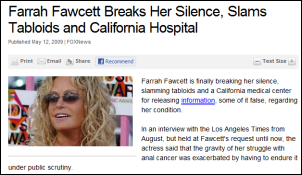
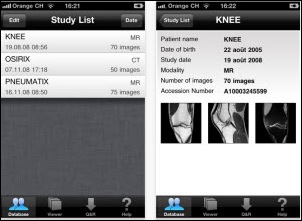

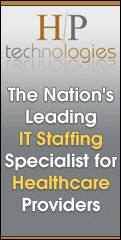


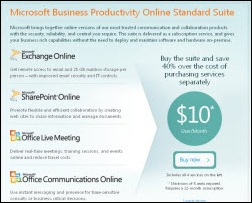

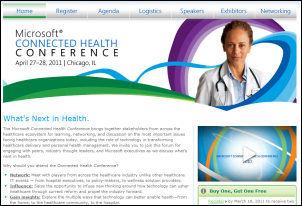

” A 2,400-bed hospital in India that treats 15,000 patients a day loses all of its electronic medical records when five of the seven HIM department computers get nailed by a virus.”
Damn viri. (or is it viruses?). The hiospital should outsource to the United States. We know how to prevent such catastrophes.
I like your idea of 2:1 on the format, Mr. H. Better than 3:0, although I confide that the old format satisfies my a.d.d. and walmart mind. Thanks again.
re: Francisco Partners: Totally agree with Mr. H, they’re not running from HCIT, they’re doing what their job as investors is: buying and selling companies the right way and at the right time. FP is one of the best buyers of HCIT I’ve seen. Incidentally, they don’t necessarily “reinvest” as it’s not an evergreen fund, they return that money (less their carried interest, of course) to their investors, then raise a new fund.
Disclosure: ST Advisors has worked with FP, Healthland and AdvancedMD.
as for the booth poll, I missed it, but think banning mimes is _always_ a good idea!
Ben Rooks
Sitting in the Investor’s Chair, waiting for questions, letters and comments!
To Tobias:
I’m a gyn in solo practice. I have patients who have content having to do with pregnancy terminations, sexually transmitted diseases, and even concerns about sexual problems that they are not comfortable sharing with others.
At the end of every visit I ask patients if they want me to send a copy of their visit to their primary care physician. A good 20% say “no” even though there may be nothing sensitive in the record.
It is no surprise that these patients would be concerned about security and privacy for their information.
I’m not nearly as worried about HIE data being hacked as I am about intentional misuse.
As an individual actively involved in a HIE implementation, I can attest to the fact that data providers (hospitals and physician practices) are concerned about privacy and security. In our instance, every data provider signs a participant agreement (legal document) indicating:
-The data shared is theirs and they should not share anything they don’t want other participants to see,
– Privacy and security is utmost. We are in a privacy and security audit to assure the participants the network is safe and private,
– All data is shared using a https protocol, encryption on both ends and VPN connectivity,
– Data is not co-mingled so any participant can “pull the plug” and know their data is gone within a day,
– Only de-identified data will be used for population health reporting, thus addressing the concern voiced by “Spring Forward”,
– The “owners” are a governance body that has a privacy and security subcommittee that monitors and provides policy,
– All HIPAA standards are strictly enforced, including full audit capabilities.
Overall, the general concensus is that the general good far outweighs the risks and the HITECH act places big incentives on participating in order to meet MU requirements. We already have several live instances where the data presented to the practitioner has saved unnecessary tests and prevented “drug shoppers” from being successful. As with most things, it’s about the money and patient safety. A properly structured HIE will eliminate costs and improve public health.
I have questioned my own some what irrational reservations about sharing my electronic medical information. I think it comes from a scene I remember in a small town ED, years ago, where a paper chart left on the ED was being read and laughed at by a group of clerk/orderly type people as I walked by to pick up some respiratory equipment. It is not finance or hackers I fear, but the conversation between my doctor an I, I would just like to keep it between the provider and myself. Is that irrational? I don’t know!
Mr. HIStalk – please kep the old format. It flows so much quicker (& better) than all the catgory listings ….
How do doctors access information thru the HIE? Is it integrated into the EHR they use? And what is the liability to the doctor if there is information within the HIE that they should have looked at but didn’t?
I hope physicians and lawyers respond with their take on HIE liability, but as for doctors accessing the information through HIE, it is typically done via an HIE Portal (search the patient, view the information, and possibly pull into the EHR) or via the actual EHR.
A question for the The PACS Designer: Are there any really good open source image viewers like OsiriX that can run on Windows?
FreePacser
Santesoft has a free DICOM Viewer for Windows 7. I’m not sure if it will work for older Windows versions. Here’s the link to it: http://www.santesoft.com/dicom_viewer_free.html
TPD!
To Tobias:
Concern about healthcare data security breaches is valid, but there are solutions.
Financial institutions have much more advanced and prevalent practices for protecting online and mobile communications than the healthcare industry. Medical identify theft – a growing problem – can cost an individual significantly more than a financial breach, for example, if expensive surgeries are fraudulently charged to a patient’s insurance policy.
However, the notion that personal electronic healthcare information cannot be properly protected reflects hype and misunderstanding. Security solutions that exceed HIPAA requirements are available to safeguard data at rest and in transit, online and mobile communications.
FreePacser
Another option for older Windows platforms is Osiris from the University Hospitals of Geneva. OsiriX is an upgrade from the Geneva original DICOM development work. Here’s the link to an older Windows platform application: http://www.dim.hcuge.ch/osiris/01_Osiris_Presentation_EN.htm
TPD!